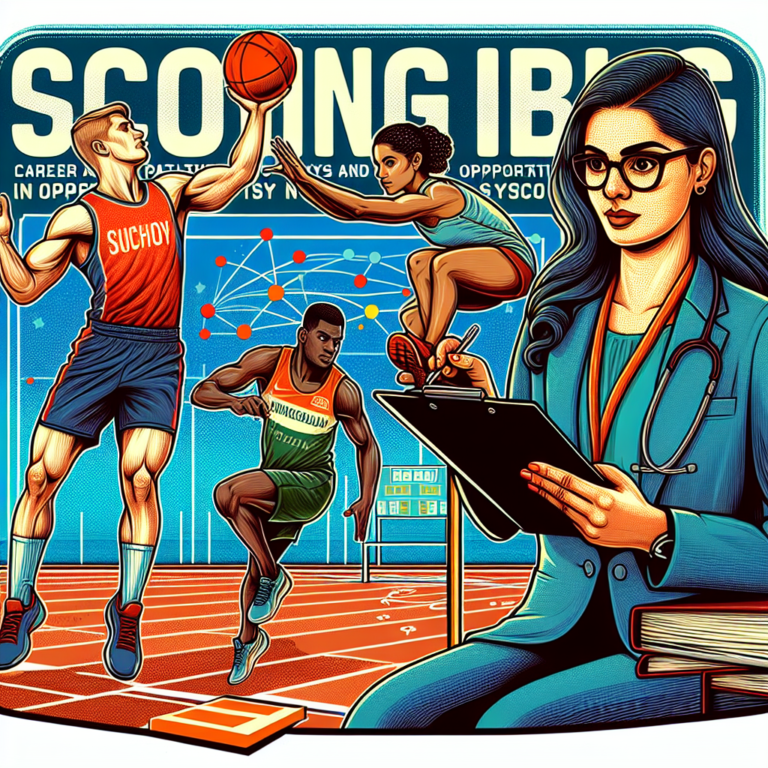
In a world where physical prowess often takes center stage, the psychological dimension of sports remains an arena underappreciated by many. Underlining the power of the mind to drive performance, sports psychology has emerged as a significant player in athletic success. If you’ve ever wondered how mental strategies can lift an athlete’s performance, welcome to "Mind Over Matter: How to Start Your Career in Sports Psychology." In this guide, we’ll explore the essential steps to thrive in this dynamic field, ensuring that you not only understand its importance but also find your way to becoming a competent sports psychologist.
Introduction: The Bridge Between Mind and Performance
Imagine an athlete standing on the precipice—ready to dive into a pool, make a game-winning shot, or sprint off the starting line. What separates those who win from those who lose often resides not in physical training alone, but in mental fortitude. Sports psychology melds the realms of psychology and athletics, making it a flourishing specialization with burgeoning demand. Whether you’re looking to help athletes conquer performance anxiety, boost motivation, or enhance mental resilience, this article will guide you through each phase of starting your career in sports psychology.
Understanding Sports Psychology: The Fundamentals
What is Sports Psychology?
Sports psychology is a specialized field that focuses on the psychological aspects influencing an athlete’s performance. This includes mental training techniques, such as visualization, concentration, and goal setting. With insights drawn from disciplines like cognitive-behavioral therapy and performance enhancement strategies, sports psychology aims to improve athletes’ mental well-being and performance.
The Importance of Mind Over Matter
The phrase "Mind Over Matter" encapsulates the essence of sports psychology. Athletes encounter numerous mental barriers, from self-doubt to pressure-induced choking. By addressing these psychological challenges, sports psychologists pave the way for athletes to overcome both internal and external obstacles. Understanding the interplay between mind and performance can provide a critical advantage in competitive sports.
Case Study: Michael Phelps and Visualization Techniques
Michael Phelps, a renowned Olympic swimmer, famously utilized visualization techniques as part of his training regimen. By mentally rehearsing his races, he prepared himself not just for the physical demands but for managing pre-race nerves and expected outcomes. Phelps’ case exemplifies how the mind can shape athletic success, making a compelling argument for the relevance of sports psychology.
Step 1: Educational Pathways in Sports Psychology
Degree Options
If "Mind Over Matter: How to Start Your Career in Sports Psychology" is your goal, the journey typically begins with the right educational background. Here are common pathways:
Bachelor’s Degree: Many aspiring sports psychologists begin with a degree in psychology, exercise science, or sports management.
Master’s Degree: A master’s in sports psychology or a related field is often crucial, providing specialized training.
- Doctorate: For those seeking to engage in research or academic roles, a PhD in sports psychology or a related field deepens expertise.
| Education Level | Common Courses | Potential Career Paths |
|---|---|---|
| Bachelor’s | Introductory Psychology, Physical Education | Sports Coach, Fitness Trainer |
| Master’s | Advanced Sports Psychology, Performance Analysis | Sports Psychologist, Consultant |
| Doctorate | Research Methods, Ethics in Sports Psychology | University Professor, Research Director |
Licensing and Certification
Understanding local regulations is vital. In many regions, sports psychologists require licensure, which may involve passing a licensing exam and completing supervised experience. Certification from organizations like the Association for Applied Sport Psychology (AASP) can also boost your credentials.
Step 2: Building Experience
Internships and Volunteer Work
Gaining hands-on experience is indispensable. Seeking internships with sports teams, fitness clubs, or performance centers allows you to apply theoretical knowledge in real-world situations. Consider volunteering for community sports programs, which can provide invaluable experience and networking opportunities.
Networking
While knowledge is essential, the importance of connections cannot be overstated. Attend workshops, seminars, and conferences related to sports psychology. Networking with professionals in the field opens doors and leads to mentorship opportunities, which can guide your career trajectory.
Case Study: A Journey from Intern to Consultant
Emily’s Journey: An intern at a local college sports team, Emily observed the crucial role of anxiety management in athletes. By actively engaging with players and conducting mental strategy sessions, she honed her skills. A few years later, Emily became a consultant for a national sports organization, demonstrating how early experiences serve as stepping stones for success.
Step 3: Developing Essential Skills
Communication Skills
An adept sports psychologist needs to communicate effectively with athletes, coaches, and other stakeholders. Developing strong interpersonal skills fosters trust and rapport, which are vital for successful interventions.
Empathy and Active Listening
Beyond data and performance metrics, understanding an athlete’s emotional landscape is critical. Cultivating empathy and honing active listening skills enables you to grasp their challenges deeply.
Analytical Thinking
Evaluating performance metrics and psychological assessments often requires analytical skills. Being able to interpret data and develop actionable insights can set you apart in this field.
Step 4: Specializations within Sports Psychology
Performance Enhancement
Focusing on strategies to enhance athlete performance, psychologists listen to athletes’ concerns and tailor techniques aimed at overcoming mental barriers.
Rehabilitation Psychology
After injuries, many athletes require psychological support to navigate their recovery journey, both mentally and emotionally.
Team Dynamics
Working with teams involves understanding group psychology and how interpersonal relationships influence team performance.
Mind Over Matter: How to Start Your Career in Sports Psychology – Next Steps
Establishing Your Brand
In an era dominated by digital presence, consider establishing your brand through social media or a personal website. Sharing insights, successes, and industry-related content will position you as a knowledgeable and approachable expert.
Continuous Learning
The field of sports psychology is ever-evolving. Engage in continuous education by attending workshops, pursuing additional certifications, and staying updated with research publications.
Building a Portfolio
Collect feedback and testimonials from clients and colleagues as you build your practice. A strong portfolio showcasing your experience can be a compelling part of your professional narrative.
Case Study: Building a Personal Brand
Michael’s Transition: After a successful career as a sports psychologist for high school athletes, Michael transitioned into a consultancy role. He began a blog detailing his journey, sharing resources, and providing advice on mental resilience. His online presence has since attracted numerous clients seeking his expertise.
Conclusion: The Mind Over Matter Testament
The intersection of psychology and sports is rich with potential. "Mind Over Matter: How to Start Your Career in Sports Psychology" serves as a blueprint for aspiring sports psychologists to navigate this fulfilling profession. As you embark on this journey, remember that every interaction impacts an athlete’s performance, mental health, and ultimately, their career.
With the right educational background, hands-on experience, and a commitment to continuous learning, you’ll not only contribute to the athletic community but also find immense personal fulfillment in aiding others to achieve their goals. The journey may be challenging, but the potential to change lives is what makes sports psychology a fundamentally rewarding field.
FAQs
1. What qualifications do I need to become a sports psychologist?
To become a sports psychologist, at least a master’s degree in sports psychology or a related field is generally required, along with licensure.
2. How do I gain experience in sports psychology?
Internships, volunteer opportunities with sports teams, and mentorships in the field are excellent ways to gain relevant experience.
3. Is there a demand for sports psychologists?
Yes, demand for sports psychologists is growing as more athletes recognize the benefits of mental training and psychological support for performance enhancement.
4. What skills are essential for success in this field?
Effective communication, empathy, analytical skills, and knowledge of psychological principles are crucial for success in sports psychology.
5. Can I specialize in a specific area of sports psychology?
Yes, specializations include performance enhancement, rehabilitation psychology, and team dynamics, each with its own unique set of demands and learning curves.
As you contemplate your future in this captivating discipline, remember that each athlete you support represents a profound human story. In the realm of sports psychology, the mind truly triumphs over matter, and your role will only enhance that journey. Let your passion guide you, and watch as you help shape the next generation of high-performing athletes.

















